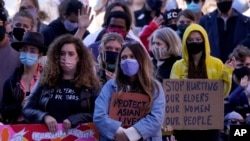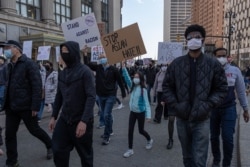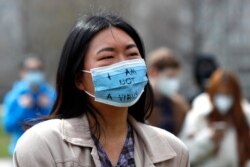One day after the mass killing in Atlanta that left six Asian-American women and two others dead earlier this month, at least five Asian-American journalists were harassed while out reporting.
The incidents show how journalists with ethnic roots in Asia have been caught up in the broader wave of hate crimes against Asian Americans set off by the coronavirus pandemic.
Stop AAPI Hate, a reporting center launched last year to track violence, harassment and intimidation, reported 3,795 incidents of harassment or violence between March 2020 and the end of February, but cautioned the true number was higher.
“There has been an uptick, especially since last year, of Asian Americans being attacked,” said Naomi Tacuyan Underwood, executive director of the Asian American Journalists Association (AAJA), which has been following incidents of harassment against its members.
“We’ve heard from our members who have experienced harassment online and on social media. We’ve also heard from our members who have experienced harassment on the job, and a lot of AAPI journalists fear for their families at this moment because of what happened in Georgia,” Underwood told VOA.
CNN correspondent Amara Walker was among those harassed on the day after the Atlanta shootings. She said someone yelled “virus” at her before a live interview in the Georgia city, while VOA journalist Paris Huang said two white people harassed him and three other Asian American journalists outside the White House.
Huang, who covers the White House for VOA’s Mandarin service, told VOA he was about to begin a live broadcast when a man and woman approached a separate crew of three female Korean-language journalists and starting asking questions about their citizenship.
“The blonde woman said, ‘Did you get permission to film the White House? We are Americans, you are not, you are foreigners, we have the right to stop you from filming our White House,’ ” Huang recalled.
As Huang started speaking Mandarin on air, they came over. Huang said his producer had to block the couple with his body from interrupting their broadcast.
It was the first time Huang felt targeted for his ethnicity while reporting. He said the experience “definitely” makes his job more difficult.
“If you have an Asian face, you are seen as foreigners, and you have less rights compared to people who think they are full Americans, which is not true,” he said. “If that’s people’s perception of you, and possible violence has been conducted to other people who have similar ethnicity, then of course it makes me worry when I go out to do my job on the street or in public places.”
'Shook me to my core'
AAJA's Underwood believes the increased harassment stems from former President Donald Trump's rhetoric during the pandemic.
“In light of the past administration, journalists and especially journalists of color and Asian American journalists are being targeted for two reasons: the distrust of media, as well as the increased hate incidents against Asian Americans due to the coronavirus being called things like ‘China virus,’ or the ‘Wuhan virus’, or the ‘kung flu’.”
There's another layer, too.
The Atlanta shootings shone a light on how anti-Asian racism is deeply entwined with sexism, and the statistics bear this out. Stop AAPI Hate found twice as many incidents reported by women than men.
Female AAPI reporters find themselves targets of a mix of racism, anti-journalism, and misogyny.
Underwood said that the most high-profile incidents against AAPI journalists during the pandemic were directed at women, three of whom work for CNN.
CNN's Walker says she was verbally assaulted with racist slurs at an airport in New Orleans last October. When her producer tried to report the incidents, a police officer told them the harassment was not racist.
“It was the fact that it happened back to back to back in the span of an hour… is what really shook me to my core,” she said on air.
After Walker spoke about her experience, the airport apologized and said it would investigate.
Others have shared experiences on social media or in columns, including CBS reporter Weijia Jiang who said on Twitter in March last year that an unnamed White House official referred to the coronavirus as “kung flu” to her face.
And Dallas-based TV journalist Tiffany Liou wrote after the Atlanta shooting that someone “said they wanted ‘that communist reporter that brought the kung flu to Texas’ to be fired."
More recently, emails and tweets directed at Washington Post reporter Seung Min Kim used demeaning and sexist language that the paper’s national editor Steve Ginsburg described as “vicious — and typical.”
“She and other minority women endure vile, baseless attacks on a daily basis, no matter what story they are working on or tweeting about,” Ginsburg said in a statement at the time.
The targeting of journalists with sexually explicit material or messages was raised at an Atlanta Press Club panel last week.
"I think any Asian woman in the public will tell you, we get emails, videos, and things from our constituents or our viewers that no other race seems to," Sophia Choi, a journalist at WSB-TV in Atlanta, told the panel. “I get porn sent my way quite often, and when I block somebody they very often find another way to contact me, and they’re very confused as to why I blocked them, because they thought I’d like that kind of stuff ... It’s happened throughout my career.”
The harassment takes a mental health toll on AAPI reporters, Underwood said.
"It’s not just the journalists who are experiencing it in person," she said. "But also second-hand trauma of journalists who may be doing the photo-editing or the copy-editing [on stories about anti-Asian hate]."
Since online hate can spill into real-world violence, Underwood said newsrooms should provide proper equipment for potentially hostile situations, and train all staff on how to handle potentially hostile encounters with the public.
“Asian American journalists are under a lot of strain and pain right now,” Underwood said, adding that despite obstacles in and outside of the newsroom these reporters provide “thoughtful, inclusive, and nuanced coverage of Asian American communities.”






